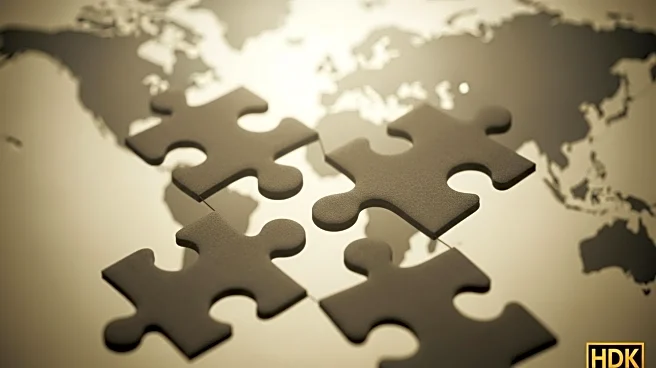What's Happening?
U.S. allies in Europe and the Indo-Pacific are increasingly coordinating on shared interests such as trade, defense, and technology, amid doubts about U.S. leadership. This shift comes as these nations face rising barriers to trade and investment, and the need to counterbalance China's dominance in manufacturing and emerging technologies. Recently, foreign ministers from the U.K., France, Germany, Japan, South Korea, Australia, New Zealand, and Poland met on the sidelines of the U.N. General Assembly to discuss closer cooperation on issues like maritime security, cybersecurity, and economic security. These countries are exploring ways to shield themselves from protectionist pressures and to collaborate on technological advancements, such as artificial intelligence and semiconductors.
Why It's Important?
The move towards greater cooperation among U.S. allies is significant as it reflects a strategic response to the changing global landscape and uncertainties in U.S. domestic politics. By pooling resources and knowledge, these nations aim to maintain their competitive edge in key technological areas and ensure the free flow of goods and services. This collaboration could lead to stronger economic and security ties, reducing reliance on U.S. leadership. However, challenges remain, such as historical tensions between Japan and South Korea, and the complexities of post-Brexit cooperation between the U.K. and the EU. Successfully navigating these issues could enhance the resilience and influence of these democratic middle powers on the global stage.
What's Next?
The next steps for these allies involve deepening their cooperation through existing frameworks like the Comprehensive and Progressive Agreement for Trans-Pacific Partnership (CPTPP) and exploring new defense collaborations, such as the Global Combat Air Program involving Italy, Japan, and the U.K. These efforts will require overcoming internal tensions and finding innovative solutions to work together effectively. The success of these initiatives could set a precedent for future collaborations, potentially leading to a more balanced global power dynamic where U.S. allies play a more active role in shaping international policies and standards.
Beyond the Headlines
This development highlights the potential for a shift in global power dynamics, where middle powers take on more responsibility in international affairs. It raises questions about the future of U.S. influence and the ability of its allies to independently navigate geopolitical challenges. The success of these cooperative efforts could redefine alliances and lead to new models of international collaboration, emphasizing flexibility and shared leadership.









